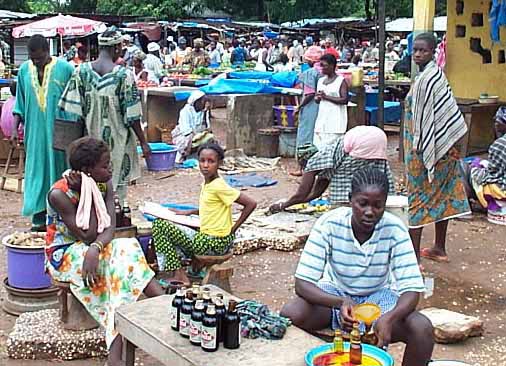
Twelve U.S. citizens in Burkina Faso pledged to "faithfully" perform the responsibilities of a U.S. Peace Corps volunteer
Peace Corps Embodies Partnership Theme of Agriculture Ministerial
United States Department of State (Washington, DC)
June 28, 2004
Posted to the web June 28, 2004
Kathryn McConnell
Ouagadougou
New volunteers take oath following end of meeting in Burkina Faso
Twelve U.S. citizens on a hot, dusty June morning in this West African capital city raised their right hands and pledged to support the Constitution of the United States and to "faithfully" perform the responsibilities of a U.S. Peace Corps volunteer.
African Studies Center Outreach Program at Boston University
In the following days they were to take up residence in villages experiencing both extreme poverty and hope for economic growth. For the next two years they would daily speak French, Moore, Jula, Fulfulde or Gulmancema. They would live, work, sing, dance and eat with people whose lives they would change as much as their new experiences would change them.
The swearing in of 12 Peace Corps education inductees is one example of what emerged as a central theme of the ministerial conference on agricultural science and technology concluded earlier in the week in Ouagadougou. During that three-day meeting June 21-23, senior U.S. officials and their counterparts from 13 West African states agreed to pursue more partnerships -- both international and regional -- to spur West Africa's economic development.
At 43, the Peace Corps is one of the oldest examples of U.S. partnership in the developing world. President Bush has proposed to significantly increase the number of Peace Corps volunteers.
The U.S. Peace Corps-Burkina Faso partnership is bringing education and technical assistance to where it is most needed -- to the villages and small- and medium-sized towns of this primarily agricultural, land-locked country of 13.5 million.
The partnership has evolved in three phases, beginning in 1967. The latest phase, begun in 1995, was in response to Burkina Faso's request for volunteers to work with its Ministry of Health to promote health education in village clinics and to revitalize the primary health care system.
Health volunteers now work with local communities to develop health promotion programs on such priority concerns as HIV/AIDS, childhood communicable diseases and guinea worm.
The parasitic guinea worm, which is being seen "less and less every year" in Burkina because of volunteers' efforts, according to Peace Corps Country Director Julie Donahue, is caused by people drinking stagnant rainwater from puddles. The semi-arid condition of much of the country means that ground water runs deep and obtaining potable water from wells is difficult, she said.
Burkina Faso decentralized its health sector in the early 1990s, making access to health care easier for people living in rural areas, Donahue said. The decentralized approach also makes it easier for health care workers to focus on prevention, rather than treatment, of communicable diseases, she said.
As an example of a Peace Corps community health project, Donohue pointed to a volunteer who organized a local theater troupe to travel to Ouagadougou for training from a professional theater troupe. Their training on scriptwriting and theatrical delivery helped them communicate important HIV-prevention messages to their neighbors in an effective, entertaining manner, she said. Funding for the project came from a small U.S. Agency for International Development (USAID) fund for Peace Corps projects, she said.
Volunteers working with Burkina Faso's Ministry of Secondary Education teach science and math to secondary education students -- most aged 12 to 18. As an additional responsibility, many also teach English. Keeping students in school through their middle- and high-school years is a challenge, Donahue said, as family responsibilities draw many students from the classroom. Just 30 percent of boys and 15 percent of girls attend secondary school, she said.
Recently, two education volunteers living in adjoining rural villages organized a Women's Day celebration -- from speeches by local women leaders, to music and dance performances by women, to a women's soccer game -- highlighting girls' talents. The event drew the support of the entire community and helped raise the young women's self-esteem.
The youngest Peace Corps program in Burkina Faso is small business development, Donahue said. In that area, volunteers are working in agribusiness, helping farmers to market and better diversify their crops in order to receive maximum profits from their efforts.
They are also helping entrepreneurs develop business plans and receive small loans to start small businesses such as cyber cafés, shops where customers can access the Internet.
More than 1,300 Peace Corps volunteers have served in Burkina Faso, said M. J. Anthony Holmes, U.S. ambassador to the country. Holmes addressed the new volunteers at their swearing-in ceremony.
Currently, volunteers (more than 7,500) are doing grass-roots development work in 76 countries worldwide, 24 in Africa, Holmes said. Nearly 100 volunteers are now in Burkina Faso -- 44 in education, 41 in health and 12 in small business development.
(The Washington File is a product of the Bureau of International Information Programs, U.S. Department of State. Web site: http://usinfo.state.gov)
